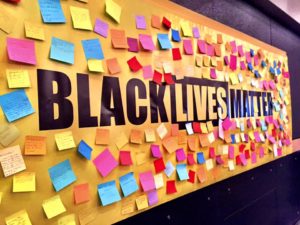“She had her teeth knocked out, had numerous black eyes. She has permanent scars from being abused, and she begged and begged for help, […] [t]hen she finally got the help, and then you take her life in front of her children.” (Monika Williams, sister of Charleena Lyles, New York Times, 6/20/17)
 On June 18th, Charleena Lyles was shot and killed by Seattle police officers in her home, minutes after responding to her call for help. Her death brings into sharp focus the intersection between police violence against Black people and violence against women. Charleena Lyles was a survivor of domestic violence. She did not survive the systems that should have protected her and her children.
On June 18th, Charleena Lyles was shot and killed by Seattle police officers in her home, minutes after responding to her call for help. Her death brings into sharp focus the intersection between police violence against Black people and violence against women. Charleena Lyles was a survivor of domestic violence. She did not survive the systems that should have protected her and her children.
For twenty years, our Washington State Domestic Violence Fatality Review has documented more than one thousand domestic violence homicide and murder-suicide deaths. This work centers the experience of both victims and their communities to analyze and think creatively about how to expand safety options for survivors marginalized by institutionalized bias, racism, and poverty. Our data shows that African American women in Washington State are 3 times more likely than white women to be killed by an abuser. Their stories call into question how our communities fail to protect victims and their children, and remind us of the systemic injustices and barriers to safety that women of color face. Charleena Lyles was not killed by an abusive partner, but her tragic death is nonetheless a stark reminder of these injustices.
According to accounts from her family and neighbors, Charleena was a mother doing the hard work of making a life for herself and her children in the face of tremendous obstacles. Her story would be familiar to any advocate for survivors. She had found stable housing in an apartment complex serving formerly homeless families, though the apartment was on the opposite end of town from her relatives and support system. The father of her younger children had assaulted her, and repeatedly showed up at her apartment in spite of a protection order she had obtained against him. Child Protective Services got involved after he smashed her car windows as she tried to drive away with the children. Her sister said that for the past year, Charleena had been fighting to prove to social workers and judges that her children were safe in her care, that it was her ex-boyfriend’s violence that put them at risk.
In a recent survey of callers to the National Domestic Violence Hotline, 1 in 10 said that someone they turned to for help reported what they shared to an official, such as police or CPS. Half of those said the report—often intended to protect children—actually made things much worse. Only 3% said it made things much better. In another survey of Hotline callers, more than half of domestic violence survivors said they thought calling police would make things worse. Of those who had called police, only one in five said they felt safer as a result. One-third felt less safe. Nearly half said police had discriminated against them. One in four were arrested or threatened with arrest when they called for help. Two thirds were afraid to call in the future.
Charleena Lyles’ death reflects the worst realization of those fears. As advocates for survivors of abuse, we have important questions to ask ourselves in the months and years ahead. When survivors fear turning to the legal system for help, what options do we offer that will help keep them safe? What is our role in creating communities that are safe and supportive for all?
When we say Charleena Lyles’ name, we are called to not only listen to, but act with Black, Brown, Native, immigrant, refugee, Muslim, LGBTQ, and other communities who struggle to survive state violence as well as domestic violence. We are called to remember that victim services are not truly “trauma-informed” without recognizing the trauma of racism. We are called, more urgently than ever, to commit our energy to solutions that recognize the intersections of oppression that so many communities face, and to center the experiences of survivors like Charleena, in life and death.
In memory of Charleena Lyles, circa 1987- June 18, 2017.
Resources
National Domestic Violence Hotline 1-800-799-SAFE
Mothers for Police Accountability
Survived and Punished – End the criminalization of survivors of sexual & domestic violence